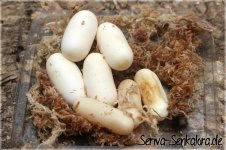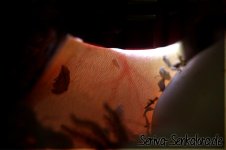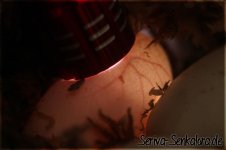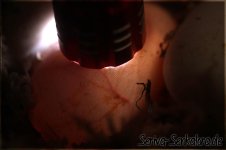Seriva Senkalora
New member
Hell there,
I'm looking for people who've had something similar and want to share their experiences with me:
I'm a hobbyist cornsnake breeder and got this season an unexpected clutch from a virgin Caramel Cinder female. She was born in summer 2015 and I got her in march 2016. She was kept single and later she shared a vivarium with my Hypo Kastanie Bloodred female in the same age and stayed with her in the same vivarium until now. On 8th of June the Caramel Cinder laid me a clutch of three slugs and four surprisingly well looking eggs. The Hypo Kastanie Bloodred has proven to be a female for sure, because she laid six slugs this season, too. I've put the four good looking eggs from the Caramel Cinder's clutch into my incubator just to see what will happen. A few days later I checked the incubator and saw the eggs being pretty nice. Still white and pearly and so I candled them and three of them do have veins in them. And when I checked them again this week, the three eggs are still doing well. The fourth also looks pretty good, but when candled it is clearly different to the others with a bright yellow color and no veins - so this is definitely unfertilized.
I am really surprised and can't wait to see if the eggs will make it and if they will hatch.
Pictures:
1x Eggs 8th of June
1x Candling 19th of June
2x Candling 3rd of July
Cheers
Seriva
I'm looking for people who've had something similar and want to share their experiences with me:
I'm a hobbyist cornsnake breeder and got this season an unexpected clutch from a virgin Caramel Cinder female. She was born in summer 2015 and I got her in march 2016. She was kept single and later she shared a vivarium with my Hypo Kastanie Bloodred female in the same age and stayed with her in the same vivarium until now. On 8th of June the Caramel Cinder laid me a clutch of three slugs and four surprisingly well looking eggs. The Hypo Kastanie Bloodred has proven to be a female for sure, because she laid six slugs this season, too. I've put the four good looking eggs from the Caramel Cinder's clutch into my incubator just to see what will happen. A few days later I checked the incubator and saw the eggs being pretty nice. Still white and pearly and so I candled them and three of them do have veins in them. And when I checked them again this week, the three eggs are still doing well. The fourth also looks pretty good, but when candled it is clearly different to the others with a bright yellow color and no veins - so this is definitely unfertilized.
I am really surprised and can't wait to see if the eggs will make it and if they will hatch.
Pictures:
1x Eggs 8th of June
1x Candling 19th of June
2x Candling 3rd of July
Cheers
Seriva




